Fripp and Gabriel - Here Comes the Flood - Frippertronics
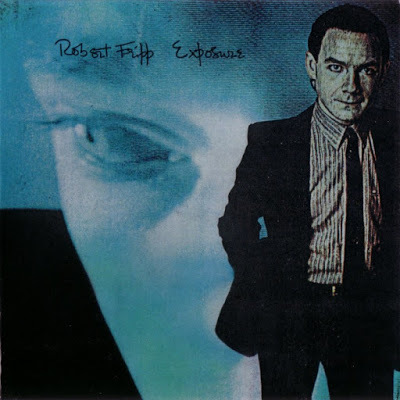 By 1975, Peter Gabriel and Robert Fripp had already left their respective gigs, Genesis and King Crimson. Somehow the two ended up in the same studio with the likes of Sandy Denny, Keith Tippett, Percy Jones (of Brand X) and Phil Collins, which proved the catalyst to Gabriel's on the spot, "You Never Know." Fripp played a simple guitar accompaniment, a unique occurrence in his session catalog, and later said of the peculiar occurrence: "This was arguably the strangest session of the entire era." The session, and the song it produced, long forgotten in the annals of music history, was significant for the mere reason that it sparked a series of encounters between Gabriel and Fripp, from Gabriel's first solo records to "Here Comes The Flood," in all its iterations, both live and in the studio.
By 1975, Peter Gabriel and Robert Fripp had already left their respective gigs, Genesis and King Crimson. Somehow the two ended up in the same studio with the likes of Sandy Denny, Keith Tippett, Percy Jones (of Brand X) and Phil Collins, which proved the catalyst to Gabriel's on the spot, "You Never Know." Fripp played a simple guitar accompaniment, a unique occurrence in his session catalog, and later said of the peculiar occurrence: "This was arguably the strangest session of the entire era." The session, and the song it produced, long forgotten in the annals of music history, was significant for the mere reason that it sparked a series of encounters between Gabriel and Fripp, from Gabriel's first solo records to "Here Comes The Flood," in all its iterations, both live and in the studio. By 1974, King Crimson was reduced to a trio, losing Greg Lake, Ian McDonald, and lyricist, Pete Sinfield. That left only Fripp, former Yes drummer Bill Bruford, and John Wetton. Despite Bruford's discontent and the seeming breakup of the rest of the band, the trio managed to record Red, a reasonably iconic if often overlooked LP. In Melody Maker in 1979 Fripp recalled: "My ego went. I lost my ego for three months. We were recording Red and Bill Bruford would say, 'Bob – what do you think?' And I'd say, 'Well' – and inside I’d be thinking how can I know anything? Who am I to express an opinion? And I’d say – ‘Whatever you think, Bill. Yes, whatever you like.'" Interesting what comes out of duress at times.
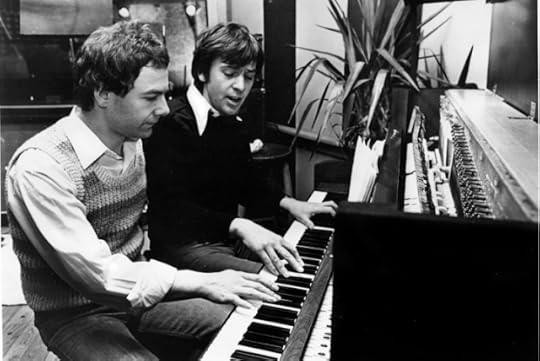
Peter Gabriel left Genesis in 1975 after the Lamb Lies Down On Broadway tour. He took time off from music in the latter part of the year and then surfaced on two musical projects. The first was the impromptu session mentioned above, the second was the soundtrack to the obscure film All This And World War 2, a bizarre marriage of Beatles' covers with footage of WW2 newsreels and films. The film tanked, expectedly, but the soundtrack faired much better. It included an interesting version of "Strawberry Fields Forever" performed by Gabriel.
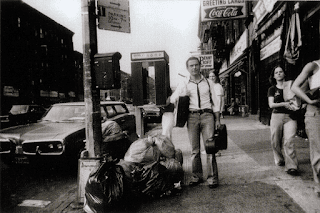 Peter wrote "Here Comes The Flood" shortly after leaving Genesis, and while stylistically he wanted to get as far from the band as possible, he used past and current band members to rehearse, including Anthony Phillips, who left Genesis in 1970. Phillips recalls, "I remember doing 'Here Comes The Flood.' We were back in Trident studios where we had done Trespass, playing at the piano that the Beatles had recorded Hey Jude'' on. It went very well. I always got on well with Peter. He was full of talk about the future and what we were currently listening to. Although he used Mike [Rutherford] and Phil [Collins], essentially it was a new broom for Peter…John Goodsall [Brand X again], nice chap, slightly eccentric, was on guitar."
Peter wrote "Here Comes The Flood" shortly after leaving Genesis, and while stylistically he wanted to get as far from the band as possible, he used past and current band members to rehearse, including Anthony Phillips, who left Genesis in 1970. Phillips recalls, "I remember doing 'Here Comes The Flood.' We were back in Trident studios where we had done Trespass, playing at the piano that the Beatles had recorded Hey Jude'' on. It went very well. I always got on well with Peter. He was full of talk about the future and what we were currently listening to. Although he used Mike [Rutherford] and Phil [Collins], essentially it was a new broom for Peter…John Goodsall [Brand X again], nice chap, slightly eccentric, was on guitar." With the exception of Gabriel's flute contribution on "Katmandu" from Cat Stevens' "Mona Bone Jakon," and the vocals for Colin Scot's eponymous LP from 1971 (which also included Collins, Fripp, Wakeman, Jon Anderson and Peter Hammill), Gabriel had never really ventured away from the comfort of Genesis.
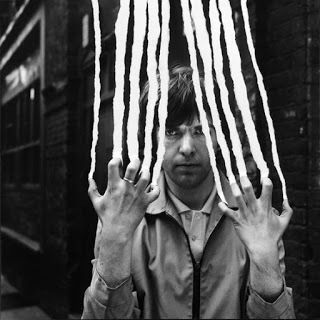 While Gabriel had Todd Rundgren in mind as he eased his way into his first solo outing, a meeting between the two lacked the spark the Gabriel sought. His next choice was Bob Ezrin, whose work included Billion Dollar Babies for Alice Cooper and Lou Reed's Berlin. Ezrin recruited studio musicians Allan Schwartzberg, Jimmy Mealen, Larry Fast (Kate Bush's Never for Ever) and bassist Tony Levin. That troupe, joined by Fripp, spent the next six months writing and recording Gabriel's debut, which of course includes "Solisbury Hill," "Moribund the Burgermeister" and of course "Humdrum" and "Here Comes the Flood."
While Gabriel had Todd Rundgren in mind as he eased his way into his first solo outing, a meeting between the two lacked the spark the Gabriel sought. His next choice was Bob Ezrin, whose work included Billion Dollar Babies for Alice Cooper and Lou Reed's Berlin. Ezrin recruited studio musicians Allan Schwartzberg, Jimmy Mealen, Larry Fast (Kate Bush's Never for Ever) and bassist Tony Levin. That troupe, joined by Fripp, spent the next six months writing and recording Gabriel's debut, which of course includes "Solisbury Hill," "Moribund the Burgermeister" and of course "Humdrum" and "Here Comes the Flood."After the release of PG1 in January 1977, Gabriel said "It's a sort of flood of the mind, a telepathic flood, which some people are able to swim, and others not. The situation where those people, who cut themselves off as islands, not being honest with themselves or with other people, will be bombarded by other people’s thoughts and other people reading their own minds and the people who have been open and straightforward would be no different."
Simultaneously, Fripp had been in spiritual discovery mode (following in the pathway of George Gurdjieff), spent the better part of '75 and early '76 touring with Brian Eno, and after which joined the session players on Gabriel's Car (the unofficial title of PG1), as well as the live performances that followed its release. Fripp stated, "I only accepted to be on the tour on the condition that I would be playing in the dark without being seen by the public. My imaginative part was really limited."
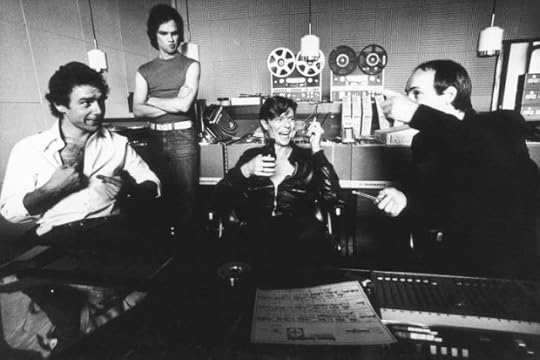 Fripp, Visconti, Bowie, EnoThen, in July 1977, Fripp got a call from Brian Eno, who was working with Bowie in Berlin on the follow up to Low. Alongside producer Toni Visconti at Hansa studio, the pair needed legit rock licks for a number of the songs. Eno didn't think twice before calling Fripp, who came in and recorded the first thing that came into his mind while listening to early takes of tracks like "Beauty and the Beast" and "Heroes," which ended up as multiple Fripp guitar tracks edited by Visconti. It was also in '77 that Fripp worked with Daryl Hall on his first solo LP, Sacred Songs, after relocating to New York. New York, of course, was in the throes of the CBGB scene with artists like Blondie and Talking Heads, who likewise sought out Fripp's expertise and innovation.
Fripp, Visconti, Bowie, EnoThen, in July 1977, Fripp got a call from Brian Eno, who was working with Bowie in Berlin on the follow up to Low. Alongside producer Toni Visconti at Hansa studio, the pair needed legit rock licks for a number of the songs. Eno didn't think twice before calling Fripp, who came in and recorded the first thing that came into his mind while listening to early takes of tracks like "Beauty and the Beast" and "Heroes," which ended up as multiple Fripp guitar tracks edited by Visconti. It was also in '77 that Fripp worked with Daryl Hall on his first solo LP, Sacred Songs, after relocating to New York. New York, of course, was in the throes of the CBGB scene with artists like Blondie and Talking Heads, who likewise sought out Fripp's expertise and innovation.Fripp enjoyed working with Hall so much he planned his next LP with Daryl doing all the vocals. That plan though was squelched by Hall's record company and only two songs survived; one of them, "North Star," with Phil Collins, Tony Levin, Brian Eno, Fripp and Sid McGinnis on pedal steel guitar. At the end of '77, Gabriel and Fripp got together again to work on Gabriel's second solo album (PG2 - Scratch), this time with Fripp as producer. The album included the song "Exposure," which would be recorded again with Terre Roach singing her heart out for Fripp's album and becoming the title song for it. In the same way that Woody Allen isn't a fan of what is arguably his best film (Manhattan), Gabriel wasn't particularly fond of Scratch (my fave PG LP) stating, "Fripp is probably still my favorite guitar player, but as a producer, I don't think it worked very well. Neither he nor I ended up that satisfied with the second album."
 In the October '78 show at the Bottom Line in New York, Gabriel, Fripp et al played "Here Comes The Flood" as an encore. Both "Exposure" and "Here Comes the Flood" showcased the guitar soundscapes that Fripp developed with Brian Eno. At the time, the process to produce the sound involved two Revox tape recorders, a technique for which Brian Eno provided a diagram on the Discreet Music album cover. Eno and Fripp had first showcased their use of the method, known as Frippertronics, on the album No Pussyfooting in 1972, with the side-long track "The Heavenly Music Corporation," a piece Fripp said was the best thing he'd ever done. "I did Frippertronics at the Kitchen in NYC in '78. It was completely improvised music, with two Revoxes. I said to Eno, 'How do you get these Revoxes working?' He drew me a diagram. I said, 'You've just done yourself out of a job."
In the October '78 show at the Bottom Line in New York, Gabriel, Fripp et al played "Here Comes The Flood" as an encore. Both "Exposure" and "Here Comes the Flood" showcased the guitar soundscapes that Fripp developed with Brian Eno. At the time, the process to produce the sound involved two Revox tape recorders, a technique for which Brian Eno provided a diagram on the Discreet Music album cover. Eno and Fripp had first showcased their use of the method, known as Frippertronics, on the album No Pussyfooting in 1972, with the side-long track "The Heavenly Music Corporation," a piece Fripp said was the best thing he'd ever done. "I did Frippertronics at the Kitchen in NYC in '78. It was completely improvised music, with two Revoxes. I said to Eno, 'How do you get these Revoxes working?' He drew me a diagram. I said, 'You've just done yourself out of a job."The recording of "Here Comes The Flood" for Fripp's Exposure LP took place in March 1978. On the album, it is preceded by another Frippertronics track called "Water Music 1." What follows is what most critics find the best-recorded version of the iconic track. Late at night, listening to Gabriel's version, or to Fripp's, I am overwhelmed, not just by the remarkable nature of the recordings, but by what transpired to create them: the time, the luck, the mishaps, and the circumstance, all coalescing into an iconic track for two diverse artists.
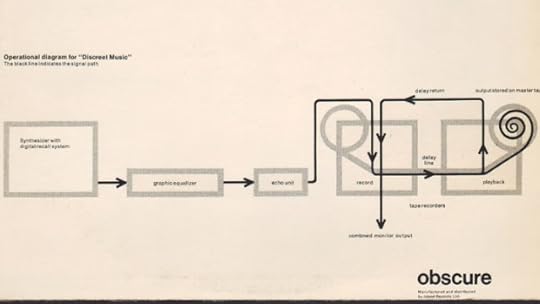
Published on July 05, 2018 04:53
No comments have been added yet.



